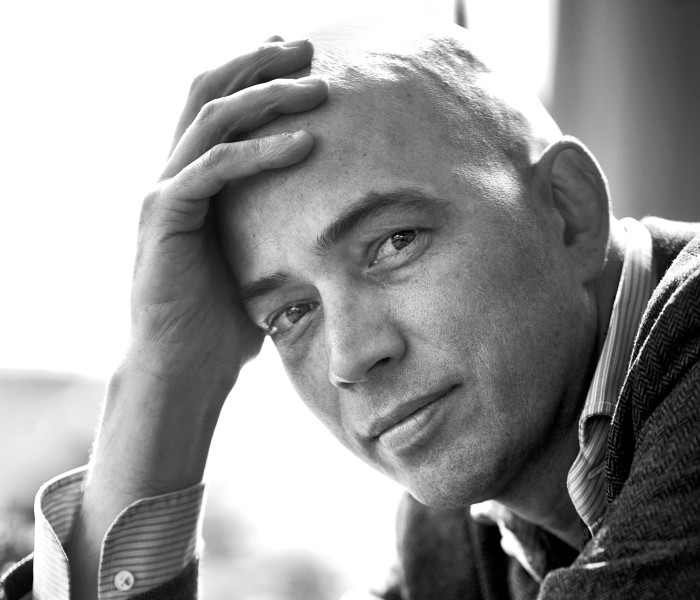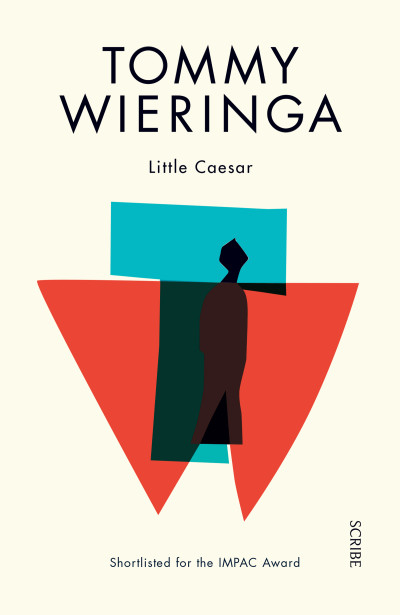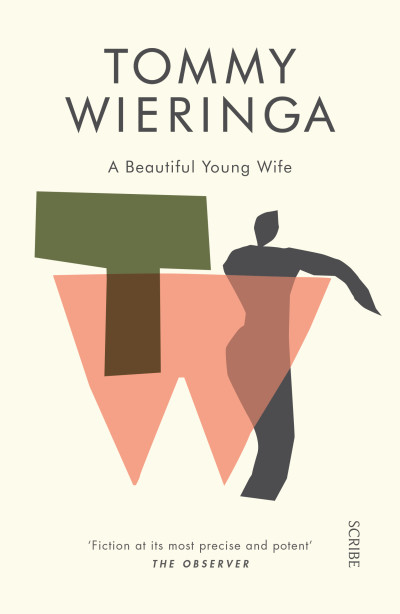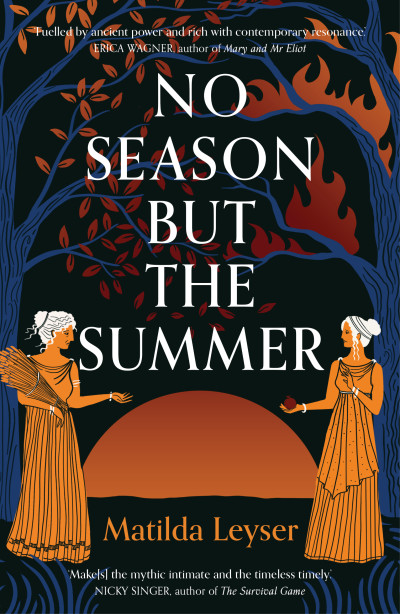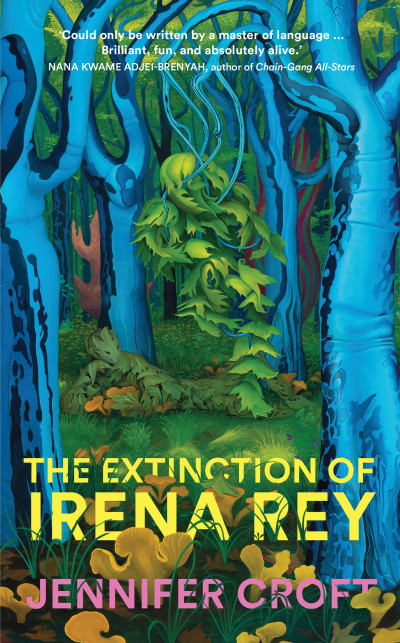‘Tommy Weiringa paints a compelling portrait of marginalised society.’
Lucy Popescu, The Tablet
‘This novel full of autobiographic humus sizzles with ambition … In The Blessed Rita, Wieringa quietly revels in scenes struck sweetly with an exuberance of colour, deposited with careless writer’s joy and grimly comedic tones. He writes like a fearless showboat in a bar, tethering his listeners to his every word … From these miniscule, damaged lives, Tommy extracts a very sensual book, drunk with language and written with a stylistic precision you will envy.’ FOUR STARS
De Volksrant
‘With a good eye for remarkable stories and sharp dialogues, Wieringa sketches an inky black portrait of a meagre emotional life and a perverse small-town culture.’
De Standaard
‘A tragicomedy of Joe Speedboat-calibre, on village souls lost amidst the modern times and the poignant clumsiness of male friendships. A wonderful novel.’
VPRO Gids
‘It is his best book, his master hand has developed itself again. The depth is deeper, the views stretch farther. His style approaches perfection, or surpasses it. His use of figurative language is economical. It’s used only when it’s dead-on.’ FIVE STARS
Algemeen Dagblad
‘The masterful The Blessed Rita is at once both The Great Twente Novel and completely European … The Blessed Rita tells the story of a shrinking life in a shrinking region — but Wieringa’s version of that familiar story feels like the ultimate one. Because: it’s described in flawless bulls-eyes of sentences that are rich in metaphor and symbolism, but which don’t cross over into melodrama. Precisely for that reason, they evoke associations with the style of Wieringa’s literary role model James Salter … Wieringa displays his full abilities as a storyteller and manages them masterfully … In the end this story is not just about big themes like shrinking regions, xenophobia or the revenge of the man-driven-into-dire-straits, but Wieringa also concerns himself with the people — he brings the big story back down to human proportions. The novels ends with a surprisingly tender and tragic note — Wieringa doesn’t only show it, he lets you feel it.’ FIVE STARS
NRC Handelsblad
‘Wieringa said this novel “cost blood, sweat and tears”, but there is not a single moment in which you feel that four year struggle. The way in which he reconciles the tragedy of the “bumpkins” with a literary tumble in wet spring grass is astonishing. At the same time, when it comes to content, you aren’t left with empty hands: migration is a burning issue, and lives that hopelessly run aground and are beyond saving transcend the ages. Just like this novel.’ FIVE STARS
Het Nieuwsblad
‘Tommy Wieringa demonstrates with The Blessed Rita that he belongs in the pantheon of Dutch literature. Amidst all of the desolation, compassion proves to be the dominant tone … Wieringa’s personal involvement can be felt in everything. Being familiar with the landscapes, the colours and the light, he brings the region stirringly to life … With an equally masterful precision he describes the leaden grey lives of his characters. In a vortex of tragicomic scenes he paints the desolation and the deadlock of life at the edge of the abyss. No one can save these hopeless causes, not even their patron saint Rita. And yet they can count on our sympathy, so convincing is the compassion that Wieringa evokes … More than just the story of a lost man, this is a portrait of a time in which those who can’t keep up, lose out. A lament for those left behind, and an ode to two clumsy men who despite the disappointment keep taking care of one another.’
De Tijd
‘In terms of style and imagery, Wieringa’s best book … Wieringa’s style in The Blessed Rita is more powerful and concentrated than ever … Though you can hear the writer speaking warily through his characters about the new times, in which the animals have disappeared from the pastures, in which the sick are only interested in their smartphones, it doesn’t wallow in nostalgia. The Blessed Rita is an ode to the Twente region, but above all it is a funny and moving plea for compassion. Compassion for those who are rooted and no longer able to move in a rapidly developing world – the hopeless causes.’
Trouw
‘Tommy Wieringa writes about his hopeless causes with empathy; he looks at them with old, wise eyes; he does them justice.’ (Book of the Month)
Vrij Nederland
‘The Blessed Rita is a wonderfully beautiful book, even without the plot-driven apotheosis.’
Telegraaf
‘An ode to the silent ones of the Twente region.’ FOUR STARS
Elsevier
‘With Tommy Wieringa you expect a masterpiece, just as you did with writers like Willem Elsschot. And he never disappoints.’
De Nieuwsbv, NPO Radio 1
‘Critical, dark, and profound fiction.’
Le Monde
‘An elegiac and beautifully written portrayal of a Dutch border village at the coalface of a New Europe, and a haunting tale of a man struggling to find purpose in a rapidly changing world, walking a tightrope between goodness and unresolved rage.’
Arnold Zable
‘The Blessed Rita is ‘the patroness of hopeless causes, of barren women and women who were unhappily married, as well as butchers and meat traders’. Tommy Wieringa tells an engrossing, sometimes funny, and, at its end frightening, story of the mixed fortunes, virtues, and vices of many of the kinds of people who need her succour. He depicts their lives though changing times, cultures, and political circumstances with insight, humane wisdom, and an eye for detail and ear for tone that is given only to someone whose heart is as lucid as his mind is sharp. He does it in prose that is always simple, yet which becomes poetry so unexpectedly that it takes one’s breath away.’
Raimond Gaita
‘A strange and interesting novel ... Wieringa’s story of a changing world has its own unnerving power.’ FOUR STARS
Penelope Debelle, SA Weekend
‘This novel full of autobiographic humus sizzles with ambition ... In The Blessed Rita, Wieringa quietly revels in scenes struck sweetly with an exuberance of colour, deposited with careless writer's joy and grimly comedic tones. He writes like a fearless showboat in a bar, tethering his listeners to his every word ... From these minuscule, damaged lives, Tommy extracts a very sensual book, drunk with language and written with a stylistic precision you will envy.’ FOUR STARS
De Volkskrant
‘It is his best book, his master hand has developed itself again. The depth is deeper, the views stretch farther. His style approaches perfection, or surpasses it. His use of figurative language is economical. It's used only when it’s dead-on.’ FIVE STARS
Algemeen Dagblad
‘Tommy Wieringa is a prolific and respected Dutch writer and this novel shows his gift for observation and detail as well as for prose.’
Sam Garrett, The Age
‘The ideas in The Blessed Rita are on the verge of breakthrough. The motifs are so relevant, so contemporary that they’re not quite defined in our societal vocabulary. Yet, Tommy Wieringa’s exploration of them is in no way half-baked … The Blessed Rita is a commendable book worth anyone’s time. Its ideas, you can’t help but think, will only become more relevant, more defined, and more urgent as we realise that people like Paul cannot be forgotten or ignored. It’s a book to take with you as a guide into the future, or one to read as you look back on the past through a melancholic, though cathartic and forgiving lens. The book’s main strength (not at all its only one) is Wieringa’s fluency in an unspoken language. He translates for us those who cannot speak for themselves or who cannot be heard. He can talk to and for anyone, it seems, even those who may not seem worth it.’
Remy Greasley, NB
‘I thought the writing was super … it is such a worthwhile narrative. Poetic language, frequent humour and bleak atmosphere make the story thrum with emotion. The translation by Sam Garrett has retained an authentic and particularly Dutch atmosphere, so that the entire reading experience is of quality and depth … The Blessed Rita is literary, engaging and atmospheric. It takes the reader into the heart both of a Dutch community as well as an ordinary man with scalpel sharp precision. I really enjoyed reading it.’
Linda's Book Bag
‘The Blessed Rita is a compelling portrait of the forgotten, and Tommy Wieringa makes a convincing case for empathy with those living on the margins of society. There is a chilling beauty to many bleak landscapes and this stark portrait of a remote Dutch community, expertly translated by Sam Garrett, reminds us that the same is true in literature … Wieringa’s novel is firmly situated in a rural topography. Sam Garrett has skilfully translated the vernacular of the countryside into simple, concise language, and brilliantly captures Paul’s subtle shifts in tone enabling the reader to sympathise with this flawed character.’
Lucy Popescu, BookBlast® Diary
‘Depressing as Paul’s flatland life may sound, The Blessed Rita is often as funny a novel as any Carl Hiaasen and as lyrical as any Cormac McCarthy, those American masters of other endless vistas. But there is also something very much Wieringa’s own in the way he teases out Paul’s descent into the heart of his own darkness … The new Dutch masters may be writers instead of painters who, like Wieringa, haunt us with portraits of people trying to keep breathing even as the waters rise around them.’
Jonathan Levi, The Dutch Riveter
‘The book is apparently semi-autobiographical but it is one in which Wieringa imagines a life not lived … Wieringa explores themes of loneliness and connection, of loyalty and ambition … The Blessed Rita finds its centre in a likeable but hopeless main character who it is easy to empathise with. Wieringa perfectly captures the beauty and stagnation of the rural Netherlands and the choices open to the people who stay there. At times bleakly comic, and at times dark and truthful, this is another tough novel from Wieringa that is well worth the effort.’
Robert Goodman, Pile by the Bed
‘This short but wonderful novel … is a boon for the reader. The book is not driven by the events and occurrences, which do indeed feature, but more by the author’s mastery. This book is, to get to the bare necessities, a joy … Tommy Wieringa has quite the illustrious reputation and with this novel it is really not hard to see why. This is a masterful, humane, not at all heavy, account of lives lived with a quiet desperation and an even quieter joy … If reviews could be condensed with anything approaching such wonderful simplicity this one would just say: make sure you read this book.’
Joe Horgan, Irish Examiner
‘I loved how the author was unafraid to take the mood of the novel into difficult / unpopular places with themes of familial obligation, rejection of sexual compromise, fanatical loyalty to flawed friends, and encroaching mental collapse. I’ve always been interested in characters who are illogically wedded to a place or a situation, and the self-loathing, frank internal monologues of Paul were refreshingly real and believable, even if it made for glum reading at times.’
The Dutch Are Weeping
Praise for Tommy Wieringa:
‘The best contemporary novels are a quest made out of literary and moral ambition. Those who have successfully pursued this Holy Grail in recent times are Bolaño with his The Savage Detectives, Sebald in Austerlitz, Coetzee with Disgrace and the late Philip Roth. From now on, to that august list must be added the name of Tommy Wieringa.’
Le Figaro
